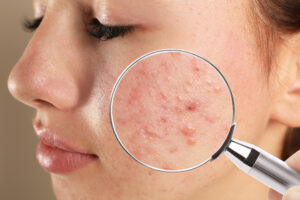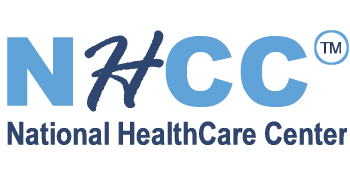 Dermatology, Acne Treatment GA
Dermatology, Acne Treatment GA
Acne occurs when the pores of the skin’s hair follicles become blocked. Pores become inflamed and infected when oil from sebum and dead skin cells get stuck inside. While the face is the most common site for an outbreak, the back, chest, and shoulders are not immune.
The skin’s sebaceous (oil) glands become inflamed, leading to acne. These glands are connected to the hair follicle, which contains fine hair. A pore is an opening in the follicle through which sebum, produced by the sebaceous glands, can escape onto the skin’s surface in healthy skin. Follicles are lined with keratinocytes, a kind of skin cell. Keratinocytes are the cells that normally come to the skin’s surface during the shedding process. The keratinocytes, sebum, and hair all clump together inside the pore, leading to the inflammation and infection that characterizes acne. This blocks the sebum from reaching the skin’s surface and stops the keratinocytes from shedding. Inflammation (swelling, redness, heat, and pain) is caused by bacteria that dwell on the skin multiplying in the blocked follicles due to the presence of oil and dead skin cells. Lesions or pimples form when the follicle wall ruptures, releasing germs, dead skin cells, and sebum into the surrounding skin. Acne affects people from all walks of life and ages, but teenagers and young adults are particularly vulnerable. During puberty, guys are more likely than females to experience the onset of acne. It’s more usual for women than males for acne to persist into adulthood.
Types Of Acne, Stockbridge GA
Acne can lead to more than one kind of lesion. Comedones are the medical term for swollen or clogged hair follicles. Varieties of acne include:
- Whiteheads: Plugged hair follicles that stay beneath the skin and produce a white bump.
- Blackheads: Plugged follicles that reach the surface of the skin and open up. They look black on the skin surface because the air discolors the sebum, not because they are dirty.
- Papules: Inflamed lesions that usually appear as small, pink bumps on the skin and can be tender to the touch.
- Pustules or pimples: Papules topped by white or yellow pus-filled lesions that may be red at the base.
- Nodules: Large, painful solid lesions that are lodged deep within the skin.
- Severe nodular acne (sometimes called cystic acne): Deep, painful, pus-filled lesions.
Acne can be caused by a combination of factors, however, doctors and researchers have identified the following as particularly important:
- Excess or high production of oil in the pore.
- The buildup of dead skin cells in the pore.
- Growth of bacteria in the pore.
Your dermatologist can prescribe an acne medication that will work more effectively, and they can also offer guidance on how to treat acne at home. How long should you give over-the-counter (OTC) remedies for acne a go before resorting to anything stronger, like a prescription drug? Products should be used for a minimum of three months or ten to twelve weeks. Once this time period has passed, you should begin to feel better. Your skin’s natural response to injury is the production of collagen, which your body can use either to strengthen the skin or to heal any damage that has already occurred. If your body generates too much or too little collagen, you may develop scar tissue: Pockmarks can be either depressed (from not enough collagen) or elevated (from too much collagen). Your dermatologist may prescribe either a topical cream or an oral tablet medicine to help you manage your acne. Your current health status, past medical history, and even your family’s medical history will all play a role in determining the medication that will be prescribed to you.
If your dermatologist determines that you have developed a bacterial infection of the skin, he or she may prescribe oral antibiotics to treat the condition. Since a severe bacterial infection does not respond well to superficial therapies like soaps, alcohol-based astringents, and other facial cleansers, it is possible that you have already tried a variety of OTC remedies without result. It’s possible that the strength of over-the-counter retinol treatments isn’t sufficient to effectively treat your acne. Prescription retinol, a kind of vitamin A, may be recommended by your dermatologist. Those with moderate to severe acne will see the most improvement from this treatment.
NCHH- National HealthCare Center, GA; Stockbridge GA Acne Treatment
Several distinct categories of skin diseases exist. Some have known hereditary causes, whereas others have not. However, nutrition, stress, sunshine, intestinal bacteria (Helicobacter pylori), and other lifestyle variables are common contributors to skin problems like acne and eczema. Consult the knowledgeable dermatologists at the National Healthcare Center for the best medical advice. We’ll zero in on the root of your skin problem and recommend effective solutions.

